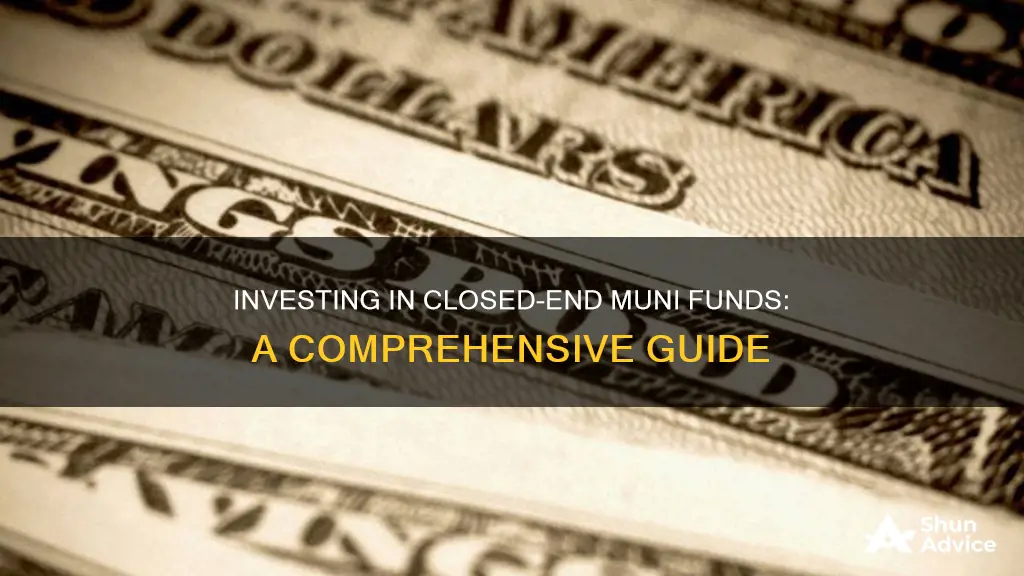
Municipal bonds are exempt from federal and state income tax, making them one of the most tax-efficient fixed-income holdings for high-net-worth investors. They also tend to perform well during rising interest rate environments. While individual muni bonds have a $25,000+ minimum investment, muni bond funds provide a cheap and easy way for any investor to build exposure to the asset class. Exchange-traded funds (ETFs) and mutual funds are the two most common investment vehicles for investing in municipal bonds via a conventional brokerage. However, closed-end funds (CEFs) may offer a better bargain in today’s environment. That’s because CEFs don’t inherently trade at their net asset value (NAV), meaning there’s an opportunity to buy a discount.
| Characteristics | Values |
|---|---|
| Tax-free income | Yields as high as 7% |
| Risk | Interest rate spikes can cause losses |
| Investment type | Municipal bonds |
| Tax benefits | Exempt from federal and (sometimes) state income tax |
| Performance | Muni bonds outperformed taxable aggregate bond indexes in six of the last seven years |
| Minimum investment | $25,000+ for individual muni bonds |
| Investment vehicles | Exchange-traded funds (ETFs) and mutual funds |
| Discount | Nuveen Municipal Value Fund Inc. (NUV) has a net asset value of $1.94 billion, or $9.51 per share, but trades at just $9.08 per share |
What You'll Learn

Muni CEFs can be purchased at a discount
Municipal bonds are prized by investors for their high credit quality and their ability to provide federal, and sometimes state/local, tax benefits. One way to buy munis at a discount and a higher yield is through closed-end funds (CEFs). CEFs are issued at a fixed number of shares at an IPO, and unlike mutual funds or ETFs, there is no creation of additional shares. Their share prices are dictated by supply and demand, which can cause them to trade at discounts or premiums to their net asset values (NAVs).
The share price of a CEF has nothing to do with its value, and often they can trade at discounts to NAV, allowing investors to buy $1 worth of bonds for 90 cents. The discount is now at some of the widest levels in nearly two decades. According to data provided by Matisse Capital, the average muni CEF is trading at an 11% discount to its NAV. This compares to a long-term average of 4% and a 1.5% discount on the funds at the beginning of 2022.
The discount/falling share price also helps boost the yield. Muni CEFs often yield more than a regular ETF or mutual fund, and as the share price dips, the yield gets larger. Today, the average muni is paying a tax-equivalent distribution rate of 6.9%. That's almost two full percentage points higher than the yield on a muni bond mutual fund.
Some of the best and largest CEFs in the space are run by Nuveen, BlackRock, and Eaton Vance. The key for investors is to find funds with large trading volumes, good discounts to NAV, and large asset bases. A few examples include the Nuveen Municipal Value Fund (NUV), BlackRock MuniYield Quality Fund (MQY), and Eaton Vance Municipal Income Trust (EVN), which all trade at big discounts to their values and offer current yields in excess of 7%.
Muni CEFs can be purchased through your brokerage account, and they offer the potential for high yields and tax advantages. However, it's important to note that they are not without risk, especially when interest rates spike.
Best Mutual Funds to Invest in India: Top Picks
You may want to see also

Muni CEFs can be purchased via a conventional brokerage
Municipal bonds are exempt from federal and, sometimes, state income tax, making them some of the most tax-efficient fixed-income holdings for high-net-worth investors. They also tend to perform well during rising interest rate environments. Muni bond funds provide a cheap and easy way for any investor to build exposure to the asset class. Exchange-traded funds (ETFs) and mutual funds are the two most common investment vehicles for investing in municipal bonds via a conventional brokerage.
However, closed-end funds (CEFs) may offer a better bargain in today's environment. That's because CEFs don't inherently trade at their net asset value (NAV), meaning there's an opportunity to buy at a discount. Muni CEFs sold off over the past few months as investors sought to position their portfolios for rising yields. While muni yields have risen faster than comparable treasuries over the past few months, investors can generate a return as the current discount aligns with historic NAV discounts or premiums.
For example, Nuveen Municipal Value Fund Inc. (NUV) has a net asset value of $1.94 billion, or $9.51 per share, but trades at just $9.08 per share, as of July 22, 2022. In addition to a modest 3.69% yield, investors could realise a significant capital gain if the fund's 4.52% discount reverts to its 3-year average premium of 0.41%.
Mutual Funds: Philippines' Smart Investment Choice
You may want to see also

Muni CEFs are tax-efficient
Municipal bonds are the most common closed-end fund (CEF) strategy, constituting nearly one-third of total CEF assets as of January 2016. Muni CEFs are popular because they offer investors a tax advantage. While municipal bond coupon payments may appear low initially, most yields are exempt from federal taxes. Additionally, most states and municipalities do not tax their residents on in-state and local muni debt income, and some states disregard muni taxation altogether. As a result, investors can often receive higher after-tax income through munis than through taxable bonds with larger published yields.
The CEF wrapper adds the benefit of a closed capital structure, a significant advantage over open-end funds in the illiquid municipal bond market. CEF managers are not forced to buy or sell based on investor appetite but can instead focus on finding the best opportunities to buy and sell securities. They can also be more fully invested in the strategy because they operate with a relatively constant amount of capital.
Muni CEFs have historically sold at a discount, which boosts the distribution rate an investor receives before any tax considerations. Compared with taxable-bond CEFs, muni CEFs tend to pay higher distribution rates at both the share price and net asset value (NAV) once taxes are taken into account.
Muni CEFs can be a great way to boost portfolio income and take advantage of tax-efficient investments. However, it's important to remember that they are not without risk. The strategy of using leverage to inflate yields can bomb when interest rates spike, raising a fund's financing costs and smashing the value of the bonds it owns.
Bond Fund Investment: Where to Begin?
You may want to see also

Muni CEFs are a good investment in a rising interest rate environment
Municipal bonds are exempt from federal and (sometimes) state income tax, boosting their after-tax yields relative to Treasuries or corporate bonds. Muni bonds are some of the most tax-efficient fixed-income holdings for high-net-worth investors due to their higher marginal tax rates. Muni CEFs are a good investment in a rising interest rate environment for several reasons.
Firstly, muni bonds have historically performed well during rising interest rate periods. According to Lord Abbett, muni bonds posted positive returns in the seven most recent interest rate hike periods, outperforming taxable aggregate bond indexes in six out of those seven years before considering their tax benefits. This means that muni bonds have a strong track record of generating positive returns even when interest rates are increasing.
Secondly, muni CEFs often sell at a discount to their net asset value (NAV), providing an opportunity for investors to buy at a lower price. For example, the Nuveen Municipal Value Fund Inc. (NUV) traded at a discount of 4.52% as of July 22, 2022. This means that investors can purchase the fund at a price lower than the value of the assets it holds, potentially leading to capital gains if the discount narrows or the fund reverts to trading at a premium.
Thirdly, muni CEFs can provide access to municipal bonds for a lower minimum investment compared to purchasing individual muni bonds. While individual muni bonds typically have a minimum investment requirement of $25,000 or more, muni CEFs offer a cheap and easy way for any investor to gain exposure to the asset class.
Additionally, muni CEFs can provide tax advantages. Muni bonds are exempt from federal taxes on their interest payments, and most states and municipalities do not tax their residents on in-state and local muni debt income. This results in higher after-tax income for investors, especially those in high-income tax brackets, when compared to taxable bonds with larger published yields.
Lastly, muni CEFs can utilize leverage to boost their returns. By borrowing money or issuing preferred shares, CEF managers can invest in longer-term muni bonds that offer higher long-term rates. Leverage can lead to higher absolute returns over the long run and has historically resulted in better risk-adjusted returns for muni CEFs compared to their unleveraged open-end counterparts.
In summary, muni CEFs can be a good investment in a rising interest rate environment due to their historical performance, the opportunity to buy at a discount, low minimum investment requirements, tax advantages, and the potential for enhanced returns through leverage. However, it is important to note that investing in muni CEFs carries risks, including interest rate risk and the potential for higher volatility due to leverage.
Maharlika Investment Fund: A Sovereign Wealth Fund for the Philippines
You may want to see also

Muni CEFs are a good alternative to individual muni bonds
Municipal bonds, or muni bonds, are exempt from federal and state income tax, making them some of the most tax-efficient fixed-income holdings for wealthy investors. They also tend to perform well during rising interest rate environments.
Muni CEFs, or closed-end funds, are a good alternative to individual muni bonds for several reasons. Firstly, they offer higher yields than individual muni bonds, with some CEFs yielding as high as 7%. Secondly, they are more affordable than individual muni bonds, which typically have a minimum investment requirement of $25,000 or more. Thirdly, CEFs often trade at a discount to their net asset value (NAV), meaning investors can buy them at a lower price than the value of the assets they hold. This provides an opportunity for capital gains if the discount narrows or disappears. Finally, CEFs provide diversification benefits by allowing investors to own a portfolio of muni bonds from different states or localities, rather than just a single bond.
However, it is important to note that CEFs are not without risk. They often use leverage, which can magnify returns but also increases the potential for losses. Additionally, the discounts at which CEFs trade can persist for long periods, and there is no guarantee that they will revert to a premium. It is also important to consider the credit quality of the bonds held by the CEF, as well as the fund's expenses and leverage when making an investment decision.
Best Debt Funds to Invest in Now
You may want to see also
Frequently asked questions
Closed-end muni funds are a type of investment fund that holds portfolios of municipal bonds, which are exempt from federal and sometimes state income tax. Municipal bonds tend to perform well during rising interest rate environments and offer high after-tax yields relative to other bonds.
Closed-end muni funds offer investors the opportunity to earn high yields, in some cases as high as 7%. They also tend to perform well during rising interest rate environments and offer tax benefits. Additionally, closed-end muni funds can be purchased at a discount to their net asset value, potentially resulting in significant capital gains.
Closed-end muni funds can be purchased through a brokerage account, and they typically have low minimum investment requirements, making them accessible to a wide range of investors. When investing in closed-end muni funds, it is important to consider the quality of the underlying bonds, discounts and premiums, and the fund's reserves.
Some popular closed-end muni funds include the BlackRock MuniHoldings Quality Fund II (MUE), DWS Municipal Income Trust (KTF), Invesco Insured Municipal Bond (IMC), Nuveen Municipal Value (NUV), and Western Asset Managed Municipals (MMU). It is important to conduct thorough research and due diligence before investing in any closed-end muni fund.







